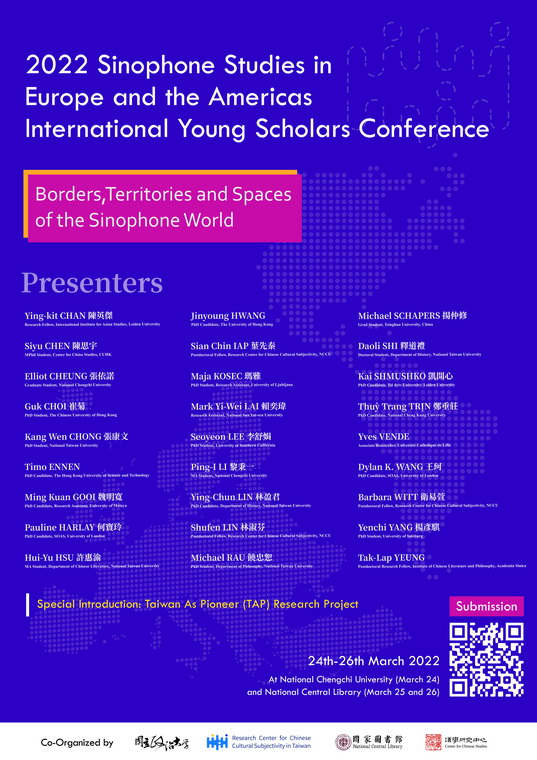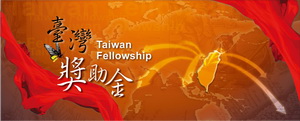2022 Sinophone Studies in Europe and the Americas International Young Scholars Conference
Theme: Borders, Territories, Spaces of the Sinophone World
‧ Date 日期 : 24th to 26th, March, 2022
‧ Venue 地點:At National Chengchi University (March 24) and National Central Library (March 25 and 26)
‧ Due to Covid considerations, participants will be mainly limited to online participation. 疫情考量,僅限線上參與。
‧ Organized by The Research Center for Chinese Cultural Subjectivity in Taiwan, National Central Library and Center for Chinese Studies(政大華人文化主體性研究中心、國家圖書館、漢學研究中心)
‧ Submission link報名連結:請點此連結
‧ This conference will be conducted in Mandarin or English 本論壇將以中文或英文進行。
‧ Special Introduction特別專題:Taiwan As Pioneer (TAP) Research Project
‧ After successful registration, you will receive a notification and webex link one day before the event.SEA 2022 CFP 報名者將於會前取得視訊連結。
Introduction:
The Research Center for Chinese Cultural Subjectivity in Taiwan (CCS) , National Central Library and Center for Chinese Studies will be hosting the 2nd Sinophone Studies in Europe and the Americas (SEA) International Young Scholars Conference in March 2022 at National Chengchi University, Taiwan. The conference will take place simultaneously online and face-to-face in Taipei, for those who are able to come to Taiwan. We invite post-doctoral researcher, Ph. D. candidate, doctoral or master’s degree student in all related fields to discuss different research approaches with their Taiwanese counterparts. We hope to provide an opportunity to discover new research horizons and to develop international approaches to transcultural and interdisciplinary research.
The goal of the SEA 2022 conference is to re-think existing paradigms in fields and sub-fields like Asian Studies, Sinology, Transcultural Studies, Religion Studies, Applied Ethics, Comparative Literature and Philosophy, History of Thought, Global History, Digital Humanities, etc. One central question that we want to explore is how to understand the idea of (geographic, linguistic, conceptual) “border” in the global present, and how different Sinophone perspectives interrogate this and other related ideas, in particular with regard to the following topics:
1. Categories and Boundaries in Transcultural Perspective;
2. Inclusivity and Demarcation in Sinophone Religions;
3. Sinophone Studies in Practical Horizon;
1. Categories and Boundaries in Transcultural Perspective
How do Sinophone philosophy, literature, historical research, and artistic practices define borders? How do different schools of thought, artistic movements and authors in the Chinese speaking/writing traditions define and put into question boundaries (categorical, disciplinary, territorial, cultural, political…)? Are there categorial systems, classificatory concepts, and typological constructions specific to the Sinophone world? How do they deal with distinctions such as "body/soul", "life/death", "inside/outside", "nation/empire", "subject/structure", "civilization/barbarism", etc.? Do they differ from other models of "bordering", past and present, East and West?
On the other hand, isn't the act of comparing a way of creating new boundaries? Or should we rather say that categorial limits are transformed and redefined through the exposure to other models and the development of transcultural patterns of thought? Do current trends in Sinophone and transcultural thinking blur the lines between traditional borders, creating new territories for thought and inventing new approaches to space? Or do they rather produce new boundaries, such as the unattainable otherness of a certain idea of "China" or a certain idea of the "West"? Isn't the increasing global interest in Chinese thought the symptom of a paradoxical double desire—the desire to break existing barriers in the direction of a certain cosmopolitan pluralism, but also the desire to reenact borders within a globalized style of thought that fetishizes cultural differences?
2. Inclusivity and Demarcation in Sinophone Religions
From the Three Religion Syncretism 三教合一 of Buddhism, Daoism and Confucianism, to the Five Religion Syncretism 五教合一 in contemporary groups such as Yiguandao 一貫道 and Dejiaohui 得教會, religion on China and Sinophone communities has a long tradition of being inclusive of diverging religious worldviews and seeing underlying unity within sometimes opposing belief systems. At the same time, proponents of various religious schools often sought to differentiate themselves from other traditions, reaffirm the supremacy of their own teachings and vie with each other for believers. Governments on occasion also heavily influenced individual beliefs and practices, such as occasional bans on slaughter and fishing related to Buddhist beliefs during the Sui and Tang dynasties, Ming emperor Hongwu 洪武 giving implicit permission to promote syncretism by penning the Treatise on the Three Religions 《三教論》, and state atheism in the People’s Republic of China. Sinophone diaspora communities nowadays can be found in states both with and without state religion, meeting different levels of tolerance.
For this conference we invite papers dealing with movements, historical developments of and discourses about both inclusivity and demarcation in Sinophone religions and how such tendencies pertain to questions of identity for believers. Topics may include (1) developments within the Sinosphere as well as (2) contact of Sinophone with inbound religions such as Buddhism, Islam or Christianity or (3) the interactions of the Sinophone diaspora with the religions of their new home countries.
3. Sinophone Studies in Practical Horizon
The development of Sinophone studies in practical horizon requires us to go back to the immediate experience of the life worlds. It also invites us to take into account the dynamics of culturing (instead of just traditional culture). The Sinophone worlds are not mere geographic territories, on the contrary, their borders are blurred: they include experiences from the plural dimensions of multiple life worlds. The different Sinophone life worlds integrate and interfere with one another, constantly producing new cultural features.
As Christian Norberg-Schulz’s “Spirit of Place” points out, we cannot limit the concept of “place” to geographic space, since it also indicates the history and meaning of communities living in a given place/space. In the practical field, ethical life is the occurrence of spiritual features and meanings, rather than just their manifestation. The SEA 2022 Conference invites contributions that put in contrast multiple aspects of the ethical life in the Sinophone world, in order to disclose the plurality of its cultural features.
Any inquiry about the meeting, please contact Mr. Tsai(02-23619132-351) of Center for Chinese Studies of National Central Library.
會議報名請洽:政治大學華人文化主體性研究中心02-29393091-67433












